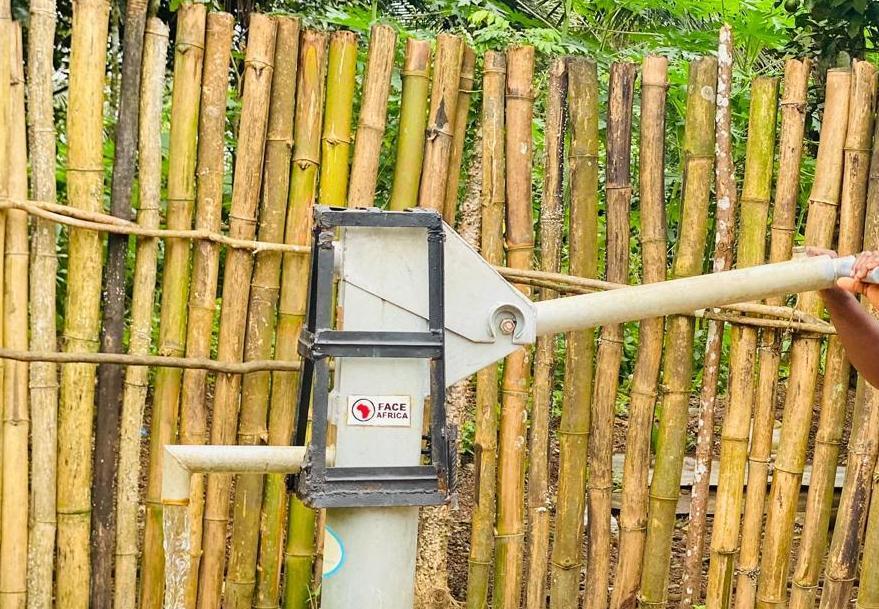Africa-Press – Liberia. A few years ago, residents of the suburbs of Bensonville, Montserrado County, frequently suffered from diarrhea, cholera and other water related illnesses, often unclean drinking water from unprotected sources like wells and rivers and worsened by the practice of open defecation in nearby bushes.
Today, that situation has dramatically improved. Thanks to the efforts of an international non-profit organization, FACE Africa, which has been drilling boreholes for clean drinking water and constructing improved latrines and hands washing facilities.
Over the past 12 months, FACE Africa—a US and Liberia-based non-profit organization—has successfully completed and handed over 256 improved latrines and hands washing facilities, 13 hand pumps and a Solar Powered Water System to eleven rural communities in Bentol, Montserrado County.
FACE Africa has also conducted intensive 12 weeks WASH training in each of the project communities for the purpose of maintenance and sustainability of the projects by the community dwellers.
Residents report that the initiatives have led to a significant reduction in cases of diarrhea and other waterborne diseases, particularly among children.
Following FACE Africa’s Health & Hygiene training sessions, community members have formed sanitation committees responsible for the maintenance and cleanliness of the boreholes and latrines.
Inhabitants of Getelleh, George Town, Nyankolor Town, and Bassa Town have shared stories of how the new facilities have helped reduce illness, especially during the rainy season when water contamination was previously rampant.
Joseph D. Johnniekai, Town Chief of Getelleh Town, noted that FACE Africa supplies chlorine to treat water and advises residents to cover their water containers and keep the surrounding of the water facilities clean.
His words, “The number of children under five who used to regularly suffer from diarrhea and waterborne diseases has significantly reduced. We also see a strong positive impact on the nutritional status of the children.”
Chief Johnniekai emphasized that the project has not only improved access to clean water but also inspired a community-wide commitment to ending open defecation and adopting good hygiene practices.
Ma Cecelia Shilling, a resident of Getelleh Town stated, “We’re glad that every household now has a latrine. I think this has solved the issue of caretaking and ownership. So, we are happy every family has their own toilet.”
A resident of George Town, Mrs. Saybah Singbeh, reflected on how the new infrastructure has changed daily life.
“In the past, it was the work of women and children to fetch water. Every morning, we would leave the village with containers, walking to creeks and rivers. It would take us one to two hours,” she noted.
She added that children often arrived late to school due to the long treks for water.
“Washing clothes was a luxury we couldn’t afford. Our children went to school in unwashed clothes. Now, I’m proud to send them to school in clean uniforms,” Mrs. Singbeh intimated.
Mrs. Singbeh also confirmed that residents have taken ownership of maintaining the facilities by forming sanitation committees
“Life has become much easier for us,” said Fatu Gibson, another resident.
Residents report that the initiatives have led to a significant reduction in cases of diarrhea and other waterborne diseases, particularly among children.
In George Town, women like Mrs. Gibson and others can now access water just a few meters from their homes instead of walking for hours. One woman was seen using water from the hand pump to wash dishes—something once considered a time-consuming chore.
Town Chief of Nyankolor Town, Henry Geteleh, recalled, “In the past, everyone used the nearby bushes as a latrine. Now, both children and parents use the household facilities built by FACE Africa. Hygiene has improved, and we clean around the hand pump regularly. We also teach our children to wash their hands properly before and after playing.”
He added that the project did not only bring clean water and sanitation infrastructure but also helped introduce long-lasting behavior changes around hygiene.
“Every family now has a latrine in their yard,” he said.
In Bassa Town, where a new hand pump and latrines are being installed for each household, resident Richard Howard expressed deep appreciation for the initiative.
“I’m grateful to FACE Africa for choosing our community,” said Mr. Howard, smiling. “I believe these new latrines and hand pumps will go a long way in eradicating sicknesses caused by open defecation and waterborne diseases.”
For More News And Analysis About Liberia Follow Africa-Press






